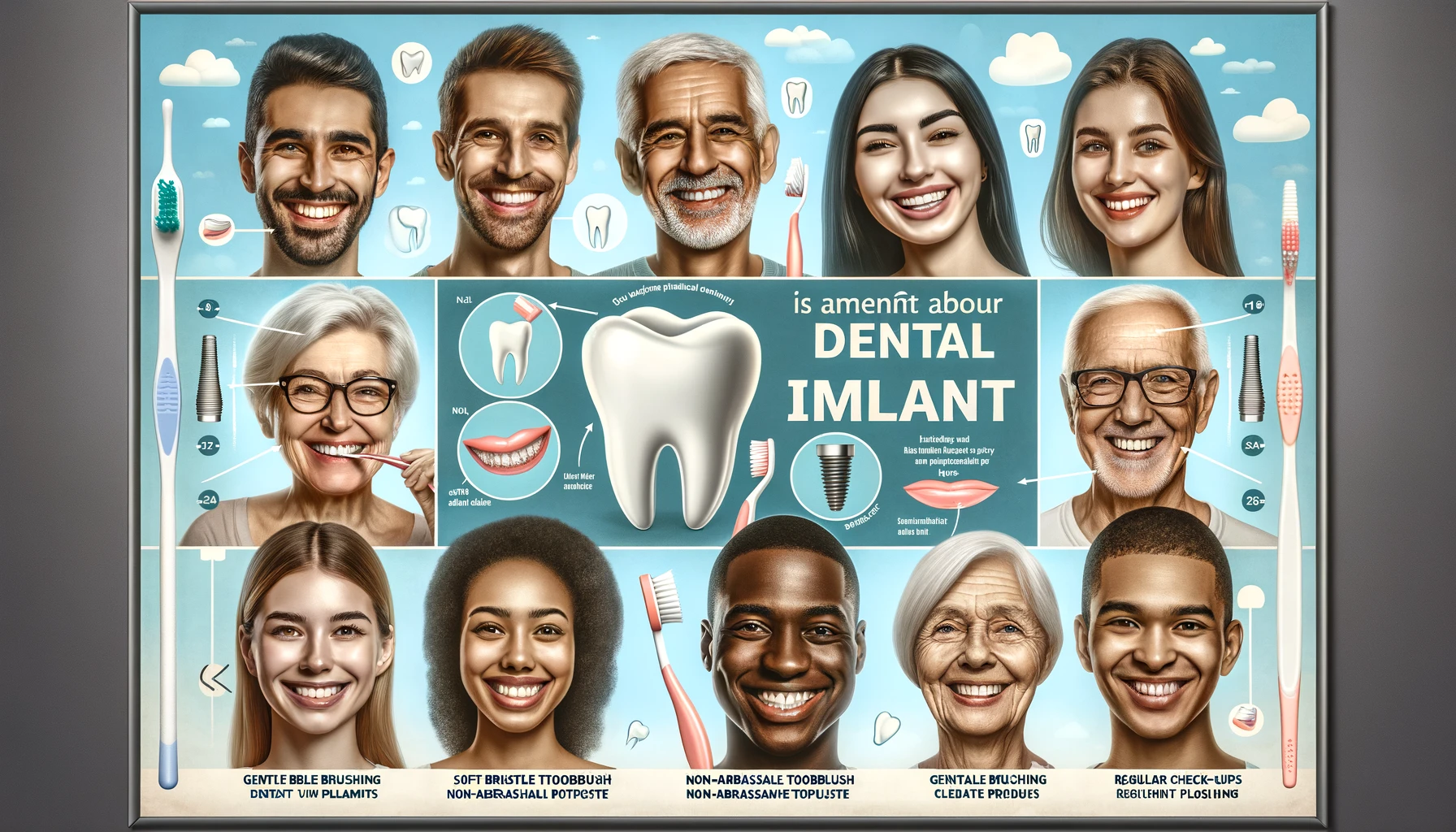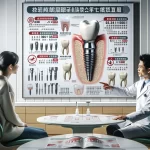Congratulations on your new dental implants! You’re now part of a growing community of over 3 million Americans who have chosen this innovative solution for tooth replacement. While dental implants significantly enhance your smile, they also symbolize a vital commitment to your oral health and overall well-being. Did you know that with the right care, these implants can last for 25 years or more? The secret to their longevity lies in a blend of consistent home care and regular professional check-ups.
In this 2025 guide on dental implant care, you’ll discover essential tips for maintaining your implants, from effective daily cleaning routines to the latest advancements in dental technology. Are you ready to protect your smile and ensure your implants remain a lasting asset? Let’s get started on this exciting journey together!
Understanding Dental Implants
What Are Dental Implants?
Dental implants are artificial tooth roots, typically made from titanium, that are surgically placed into your jawbone. They serve as a sturdy foundation for mounting replacement teeth or bridges. Unlike dentures, which can slip or cause discomfort, implants are securely anchored in the jawbone, providing stability and confidence.
The Anatomy of a Dental Implant
A typical dental implant consists of three main components:
- The Implant: A titanium post that is surgically embedded into the jawbone.
- The Abutment: A connector that sits atop the implant, holding the crown in place.
- The Crown: The visible part of the tooth, custom-made to match your natural teeth.
Benefits Over Traditional Options
Dental implants offer several advantages over traditional tooth replacement options:
- Improved Appearance: They look and feel like your own teeth.
- Enhanced Speech: No slipping means clearer speech.
- Comfort: They become part of you, eliminating discomfort.
- Easier Eating: They function like your own teeth, allowing you to eat your favorite foods without worry.
- Improved Oral Health: Nearby teeth remain unaltered to support the implant.
- Durability: With proper care, implants can last a lifetime.
Success Rates
According to the American Academy of Implant Dentistry, dental implants boast an impressive success rate of 98%. This high success rate is largely attributed to proper aftercare and maintenance.
Immediate Post-Operative Care
The first few weeks after your implant surgery are crucial for successful healing and integration. Here’s what you need to know:
First 24-48 Hours
Control Bleeding: Bite down gently on gauze packs placed over the surgical areas, changing them as needed.
Manage Swelling: Apply ice packs to the cheek adjacent to the surgical area (20 minutes on, 20 minutes off).
Pain Management: Take prescribed pain medication as directed.
Rest: Avoid strenuous activities for at least 24 hours after surgery.
First Week
Oral Hygiene: Rinse gently with warm salt water (1/2 teaspoon of salt in a cup of warm water) 2-3 times daily.
Diet: Stick to soft foods and avoid hot foods and drinks.
Avoid: Smoking, alcohol, and touching the surgical site.
Common Challenges and Solutions
| Challenge | Solution |
|---|---|
| Excessive bleeding | Apply pressure with gauze; if persistent, contact your dentist. |
| Severe pain | Take prescribed pain medication; consult your dentist if pain intensifies after 3 days. |
| Fever | If temperature exceeds 101.5°F, contact your dentist immediately. |
Daily Dental Implant Hygiene
Once your implants have healed, maintaining a rigorous daily hygiene routine is crucial for their longevity.
Brushing Techniques
Brush at least twice daily using a soft-bristled toothbrush.
Use gentle, circular motions around the implant and crown.
Pay extra attention to where the implant meets the gum line.
Pro Tip: Consider an electric toothbrush with pressure sensors to avoid applying too much force.
Flossing and Interdental Cleaning
Flossing is essential for removing plaque and food particles from areas that a toothbrush can’t reach:
Use unwaxed tape or implant-specific floss.
Gently guide the floss between the implant and adjacent teeth.
For hard-to-reach areas, consider using interdental brushes or a water flosser.
Mouthwash and Oral Rinses
Use an alcohol-free, antimicrobial mouthwash designed for implants. Rinse for 30 seconds after brushing and flossing. For the first few weeks post-surgery, your dentist may recommend a chlorhexidine rinse.
Product Recommendations: | Product Type | Recommended Product | |————–|———————————————| | Toothbrush | Oral-B iO Series 9 Electric Toothbrush | | Floss | GUM Soft-Picks Advanced | | Mouthwash | CloSYS Gentle Mint Mouthwash |
Professional Maintenance and Check-Ups
Regular dental check-ups are essential for maintaining the health of your implants and catching any potential issues early.
Frequency of Dental Visits
Most dentists recommend check-ups every six months. However, you may need more frequent visits during the first year after getting your implants.
What to Expect During Check-Ups
During your check-up, your dentist will:
Examine the implant and surrounding tissues.
Check the stability of the implant and crown.
Clean the implant and remove any plaque or tartar.
Take X-rays to assess bone levels (usually once a year).
Importance of Regular X-rays
X-rays allow your dentist to:
Monitor bone levels around the implant.
Detect any signs of bone loss early.
Ensure that the implant hasn’t shifted position.
Lifestyle Considerations for Implant Health
Your daily habits can significantly impact the longevity of your dental implants.
Dietary Recommendations
To support bone health:
Eat a balanced diet rich in calcium and vitamin D.
Avoid excessively hard or sticky foods that could damage the implant or crown.
Stay hydrated to promote overall oral health.
Habits to Avoid
- Smoking: Increases risk of implant failure and peri-implantitis.
- Excessive Alcohol Consumption: Can impair healing and bone metabolism.
- Teeth Grinding: Consider using a night guard if you grind your teeth while sleeping.
Managing Chronic Conditions
Certain health conditions can affect implant health:
- Diabetes: Keep blood sugar levels under control to promote healing and reduce infection risk.
- Osteoporosis: Work with your doctor to maintain bone density.
- Autoimmune Disorders: Follow your treatment plan to manage inflammation effectively.
Potential Complications and Warning Signs
While dental implants have a high success rate, it’s important to be aware of potential complications.
Common Issues
Peri-implantitis: An inflammatory condition affecting gums and bone around the implant.
- Signs: Redness, swelling, bleeding, or pus around the implant.
Implant Loosening: Can occur due to infection or insufficient bone integration.
- Symptoms: Pain, mobility, or visible gap between implant and gum.
Crown Damage: The visible part can chip or crack.
- Signs: Visible damage or changes in bite alignment.
When to Contact Your Dentist
Seek immediate dental attention if you experience:
- Severe pain or discomfort
- Visible implant movement
- Persistent swelling or bleeding
- Fever or signs of infection
Prevention Strategies
To maintain optimal health for your dental implants:
- Maintain excellent oral hygiene practices.
- Attend regular dental check-ups diligently.
- Avoid habits that could damage the implant (like chewing ice).
- Wear a mouthguard during contact sports.
Latest Innovations in Implant Technology (2024 Update)
The field of dental implantology is constantly evolving with exciting developments:
3D Printing Advancements: Offers unprecedented customization for perfect fits tailored to each patient’s unique anatomy.
Minimally Invasive Techniques: New surgical approaches minimize trauma and speed up recovery times, making implants accessible to more patients.
All-on-4 Implants: This innovative technique allows full arch restoration with just four implants, reducing cost and treatment time significantly.
Zirconia Implants: A strong alternative material that offers aesthetic benefits without metal visibility.
Digital Workflow Integration: Enhances precision in planning and executing dental procedures through advanced imaging technologies.
Conclusion
Your dental implants are more than just replacements for missing teeth—they’re gateways to improved confidence, better health, and a brighter smile. By following the care guidelines outlined in this guide, you’re setting yourself up for decades of success with your implants.
Remember:
- Maintain rigorous daily oral hygiene practices.
- Attend regular dental check-ups diligently.
- Be mindful of lifestyle factors that can impact implant health.
- Stay alert for any signs of complications.
With proper care, your dental implants can last a lifetime—allowing you to eat, speak, and smile with confidence for years to come! Here’s to your continued oral health and happiness in 2024!
Frequently Asked Questions (FAQs)
What is the average cost of a dental implant?
- Average costs vary based on location, material, and complexity but typically range from $1,000 to $3,000 per implant (excluding crown).
How long do dental implants last?
- With proper care, they can last indefinitely; crowns usually need replacement every 10–15 years due to wear.
Are dental implants safe for everyone?
- Most people are good candidates; however, those with certain health conditions may require additional evaluation.
Can dental implants get cavities?
- Implants cannot get cavities but maintaining good oral hygiene is vital for surrounding teeth’ protection against decay.
What should I expect during dental implant surgery?
- The process involves multiple steps including placement surgery under local anesthesia with prescribed pain relief managing minor discomfort throughout recovery which may take several months.







